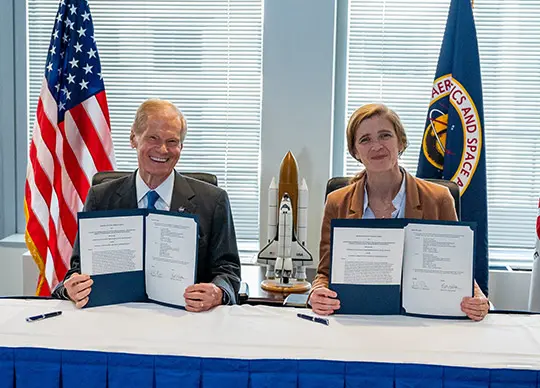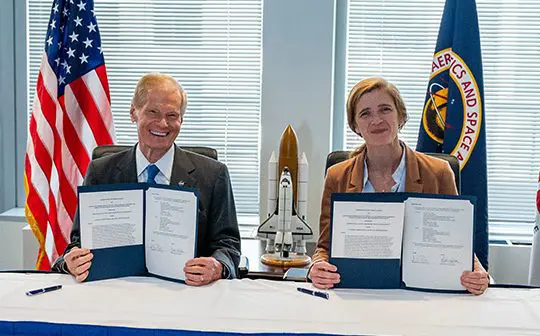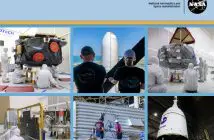
NASA and the U.S. Agency for International Development (USAID) signed an agreement Friday strengthening the collaboration between the two agencies, including efforts that advance the federal response to climate change.
Specifically, the memorandum of understanding (MOU) enhances and expands the agencies’ longstanding partnership that promotes science and technology solutions to address international development challenges in areas such as global health, climate change, food security, disaster mitigation, and response, biodiversity conservation, environmental management, and enable open science and data infrastructure for sustainable development.
“NASA’s partnership with USAID is empowering people around the world. Together, we are providing scientists, leaders, and citizens across the globe with access to NASA’s one-of-a-kind expertise and data and apply it to real-world problems on the ground,” said NASA Administrator Bill Nelson. “Today’s signing continues NASA and USAID’s work to monitor air quality, help governments adapt in the face of growing threats caused by extreme weather, strengthen food security, decrease poverty, and more. This is just another powerful example of the Biden-Harris Administration’s commitment to science and leadership – from the Amazon to the Sahara, the Himalayas, and everywhere in between.”
This MOU also extends the collaboration between NASA and USAID into other NASA programs, most notably with the NASA Disasters program area within the agency’s Earth Science Applied Sciences Program. In addition to working to prepare communities by increasing resilience to future disasters, the NASA Disasters program area provides expertise and assistance before, during, and after disasters in the form of subject matter expertise, imagery, data, tools, maps, and trusted partnerships. In addition, Disasters program personnel collaborate with USAID, SERVIR, and other domestic and international local and federal governmental and non-governmental groups to share NASA’s capabilities.
The agencies also have agreed to explore how efforts promoting science, technology, engineering, and mathematics education can be advanced through joint support of programs such as Global Learning and Observations to Benefit the Environment (GLOBE). GLOBE is a worldwide primary and secondary school-based science and education program funded by NASA and other U.S. agencies.
In addition to highlighting the important relationship and ongoing work between NASA and USAID – and the societal benefits that come from space exploration and research – the MOU reaffirms the Biden-Harris Administration priorities relating to the climate crisis and advocating for educational programs that increase diversity, equity, inclusion, and accessibility.
Prior to this latest agreement, NASA and USAID have longstanding collaborations through SERVIR and the Famine Early Warning Systems Network. SERVIR is a joint initiative aimed at co-developing innovative solutions and applications of NASA Earth science data to improve resilience and sustainable resource management at local, national, and regional scales. SERVIR is making an impact in more than 50 countries by working with and through regional technical organizations around the globe. The early warning network provides decision-makers and planners with actionable information to address food insecurity. Both collaborations have proven the value of using NASA’s latest satellite data and other information to not only impact local users’ decisions but also help USAID evaluate the impact of their investments from a broader perspective.





